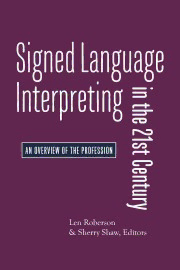
Signed Language Interpreting in the 21st Century : Foundations and Practice PDF
Preview Signed Language Interpreting in the 21st Century : Foundations and Practice
Signed Language Interpreting i n t h e 2 1 s AN OVERVIEW OF THE PROFESSION t C e n t u r y Len Roberson & Sherry Shaw, Editors Signed Language Interpreting in the 21st Century Prelims_Final.indd 1 8/2/2018 10:40:44 PM Prelims_Final.indd 2 8/2/2018 10:40:44 PM LEN ROBERSON AND SHERRY SHAW, Editors Signed Language Interpreting in the 21st Century An Overview of the Profession Gallaudet University Press Washington, DC Prelims_Final.indd 3 8/2/2018 10:40:44 PM Gallaudet University Press Washington, DC 20002 http://gupress.gallaudet.edu © 2018 by Gallaudet University All rights reserved. Published 2018. Printed in the United States of America Library of Congress Cataloging-in-Publication Data Names: Roberson, Len. | Shaw, Sherry, editors. Title: Signed language interpreting in the 21st century : an overview of the profession / Len Roberson and Sherry Shaw, editors. Description: Washington, DC : Gallaudet University Press, [2018] Identifiers: LCCN 2018020068| ISBN 9781944838249 (hard cover :alk. paper) | ISBN 9781944838256 (e-book) Subjects: LCSH: Interpreters for the deaf—United States. | Sign language—Study and teaching—United States. Classification: LCC HV2402 .S547 2018 | DDC 331.7/6141970802—dc23 LC record available at https://lccn.loc.gov/2018020068 ∞ This paper meets the requirements of ANSI/NISO Z39.48-1992 (Permanence of Paper). Prelims_Final.indd 4 8/2/2018 10:40:44 PM CON TENTS Contributors vii 1 Interpreting: An Overview 1 LEN ROBERSON 2 Historical Foundations of a Trust-Based Profession 23 CAROLYN BALL 3 Promoting the Use of Normative Ethics in the Practice Profession of Community Interpreting 37 ROBYN K. DEAN AND ROBERT Q POLLARD, JR. 4 Aptitude and Disposition: Learned vs. Nurtured Characteristics of Student Interpreters 65 SHERRY SHAW 5 Interpreting in Healthcare Settings: More Than Needles, Blood, and Terminology 73 LAURIE SWABEY 6 Interpreting in Vocational Rehabilitation Contexts 93 LINDA K. STAUFFER Prelims_Final.indd 5 8/2/2018 10:40:44 PM vi Contents 7 Interpreting in Legal Contexts 115 CARLA M. MATHERS 8 Interpreting for People Who Are DeafBlind 131 SHERRY SHAW 9 Credentialing and Regulation of Signed Language Interpreters 149 ANNA WITTER-MERITHEW 10 International Perspectives on Interpreting: Isn’t Everything Just Like at Home? 173 DEBRA RUSSELL Appendix: Objectives, Keywords, Questions, Activities 199 Index 221 Prelims_Final.indd 6 8/2/2018 10:40:44 PM CON TRIBUTORS Carolyn Ball Debra Russell VRS Interpreting Institute Department of Educational Salt Lake City, Utah Psychology University of Alberta Robyn K. Dean Edmonton, Canada Department of American Sign Language and Interpreting Sherry Shaw Education Department of Exceptional, Deaf, National Technical Institute and Interpreter Education for the Deaf University of North Florida Rochester, New York Jacksonville, Florida Carla M. Mathers, Esq. Linda K. Stauffer Hyattsville, MD Interpreter Education Program University of Arkansas Robert Q Pollard, Jr. Little Rock, Arkansas Administrative Council National Technical Institute Laurie Swabey for the Deaf Department of American Sign Rochester, New York Language and Interpreting St. Catherine University Len Roberson St. Paul, Minnesota Department of Exceptional, Deaf, and Interpreter Education Anna Witter-Merithew University of North Florida Project CLIMB Jacksonville, Florida University of North Colorado Greely, Colorado vii Prelims_Final.indd 7 8/2/2018 10:40:44 PM Prelims_Final.indd 8 8/2/2018 10:40:44 PM 1 Interpreting: An Overview LEN ROBERSON Defining Terms: What Is It We Do? An interpreter conveys what is said or signed in one language into another language while maintaining the original intended message. Interpreting al- lows two or more individuals who do not share a common language to engage in a communicative interaction through a person who is bilingual. Signed language interpreters render “a spoken or signed source language message into a spoken or signed target language in real time” (International Organization for Standardization, 2014, p. 1). Within the field of signed language interpretation, interpreters not only work between two or more languages, but also between different forms of the same language. This process, working between different forms of the same language, is referred to as transliterating. According to Winston (1989), transliterating is “a specific form of sign language interpreting.” It is the process of changing one form of an English message, either spoken English or signed English, into the other form. Translation, although often confused with interpreting, is a unique, albeit closely related, linguistic dis- cipline. Translation is the process of converting a message in one printed language to the same message in another printed language while retaining all of the original meaning. Translators, like interpreters, work to not only maintain the integrity of the message itself, but also to include cultural understanding in the translation. There are times when signed language interpreters perform a similar task known as sight translation, working from a printed text into sign language. For example, an interpreter may have to translate an intake document in a doctor’s office for a Deaf consumer who 1 Chapter 01_Final.indd 1 8/2/2018 9:46:54 PM
